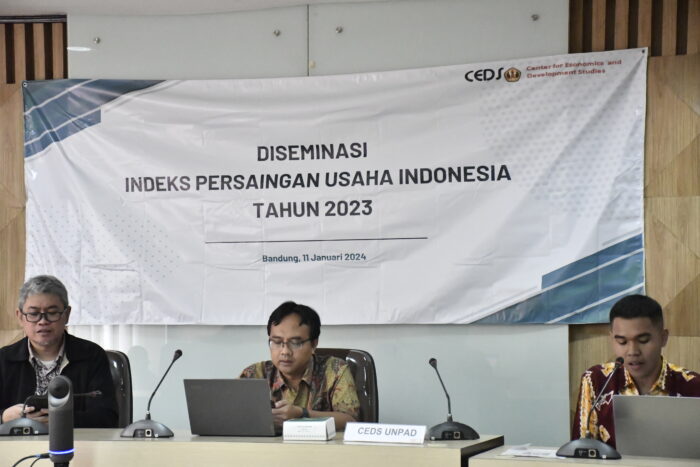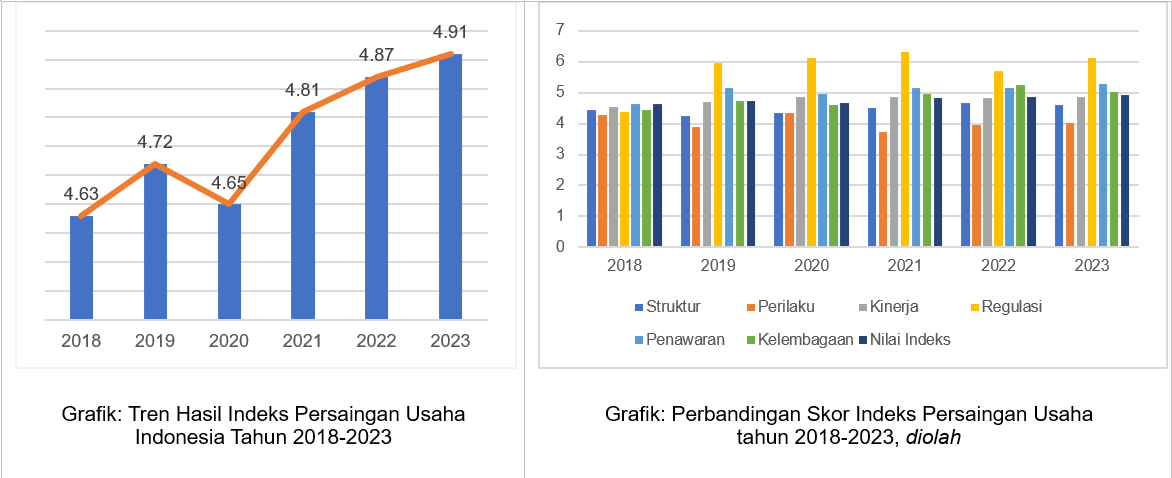CEDS Unpad: Indonesia’s Business Competition Level in 2023 Increases.

Bandung (11/01) – The Center for Economics and Development Studies (CEDS) of Padjadjaran University (UNPAD) concluded that the level of business competition in Indonesia in 2023 has slightly increased. This conclusion is shown by Indonesia’s Business Competition Index (IPU) last year, which increased by 0.04 from the previous year to 4.91. In 2022, the IPU reached 4.87. This shows that the level of business competition in Indonesia is at a slightly high level. This increase illustrates the condition of the business competition climate in Indonesia and the performance of competition competitiveness, which has increased slightly despite the current global economic conditions. The results of this index measurement were presented by Prof. Maman Setiawan from CEDS UNPAD on January 11, 2024, at the UNPAD CEDS Auditorium in a hybrid manner to stakeholders and the media. The event was also attended by representatives of ICC members for the 2024–2029 period, BAPPENAS, and the winning team of the 2024 RI presidential candidates.
Over the past few years, CEDS has measured Indonesia’s IPU with various dimensions such as structure-conduct-performance (SCP), regulatory dimension, supply dimension, demand dimension, and institutional dimension. The index is measured through a survey of 34 (thirty-four) provinces and 15 (fifteen) economic sectors, with respondents representing various stakeholder institutions such as the Chamber of Commerce and Industry, academics, Bank Indonesia, and the Provincial Industry and Trade Office. Each dimension has related indicators to explain each dimension. This measurement is obtained through the use of several concepts such as SCP (dynamic), contestable market hypothesis, quite-life hypothesis, efficient-structure hypothesis, and new empirical industrial organization (NEIO) conducted in each province to see the economy per region.

Furthermore, based on the IPU study, it was found that three sectors had the lowest level of business competition, namely (1) electricity and gas procurement, (2) water procurement, waste management, waste, and recycling, and (3) mining and quarrying. Even the electricity and gas procurement sectors, as well as the water procurement and waste management sectors, experienced a decrease in the index or stagnated compared to last year. Meanwhile, the three sectors with the highest business competition are (1) provision of accommodation and eating and drinking, (2) wholesale and retail trade, repair of cars and motorcycles, and (3) financial services and insurance. Although the average index increased, UNPAD CEDS identified a decrease in the index for the dimensions of market structure or concentration, demand in the market, and competition institutions. By province, DKI Jakarta, Central Java, and D.I. Yogyakarta sequentially occupy the highest position in the index value. Meanwhile, West Papua, Special Region of Aceh, and North Maluku have the lowest index values.
For this reason, in general, CEDS UNPAD recommends the Indonesia Competition Commission (ICC) and the government to:
- maintain IPU performance on dimensions that have increased index scores, namely the dimensions of behaviour, performance, regulation, and supply;
- evaluate and improve IPU performance on dimensions that experienced a decrease in index scores, namely the structure, demand, and institutional dimensions;
- maintain and improve the performance of sectors that experienced an increase in index score;
- evaluate the performance of sectors that did not experience an increase in index scores (such as electricity and gas procurement, as well as water procurement and waste management); and5. improve monitoring and provide advice and consideration on economic sectors that consistently have low or below average IPU, such as mining and quarrying, electricity and gas procurement, water procurement, waste management, waste and recycling, and construction and real estate sectors.
In particular, CEDS UNPAD also made recommendations to the government to:
- facilitate markets that are non-discriminatory, do not facilitate monopolies, and remove barriers to entry;
- encourage stability in demand and supply, including variations in the availability of inputs and outputs in the market;
- encourage the mainstreaming of business competition in various policy making; and4. encouraging regulations to truly support fair business competition.
Responding to the UNPAD CEDS results, Chairperson of the ICC for the 2024–2029 period, M. Fanshurullah Asa, welcomed the IPU results in improving ICC supervision of sectors that experienced a decline in the index. Furthermore, ICC Deputy for Studies and Advocacy, Taufik Ariyanto, will discuss various recommendations submitted as well as convey the IPU results to local governments and how these results can be linked to other national indicators. Director of Trade, Investment, and International Economic Cooperation of BAPPENAS, P.N. Laksmi Kusumawati, in her response generally confirmed that business competition is still concentrated in the Western region of Indonesia, and the index results are in line with the results of other existing indicators, such as trade freedom, which shows that there are still problems with trade barriers in Indonesia.






